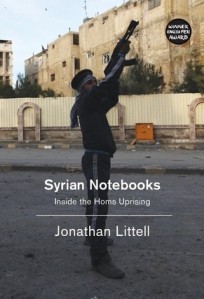
Robin Yassin-Kassab:
Littell’s account is unembedded, and his narrative – pared down to the physical, psychological and political details – is never gullible. He records an informational chaos in which contradictory versions swirl, and remarks, for example, on revolutionaries feeding al-Jazeera a false report of captured Iranian officers – they turned out to be engineers working at a power plant. The civilian Media Office, then still clinging to the revolution’s non-violent image, persistently obstructs Littell’s investigations. The armed resistance is more helpful, though it too betrays anger that foreign coverage doesn’t translate into solidarity. “The period when we showed things is over,” complains one officer. “If your peoples haven’t understood for eleven months, there’s no point.”
Littell travels not by permission of the regime’s security grid, but via the “counter-grid” which circumvents it, a network including revolutionary Christians, an Alawi resistance fighter, and a woman who, having lost three sons to Assad, has vowed to cook for the fighters daily. He drinks syrupy whisky with a man who “believes in Karl Marx the way others believe in Jesus or Muhammad,” and affectionately finds the Free Army to be “novice guerillas; novices in PR, above all.” '
No comments:
Post a Comment